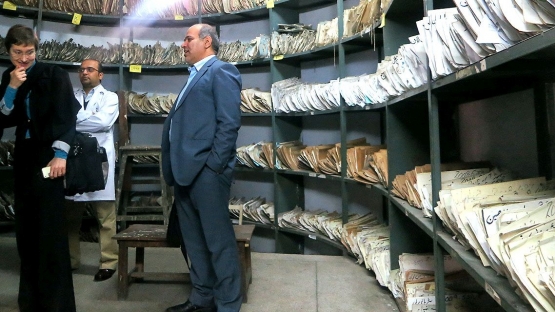In a country which faces almost 150 000 new cancer cases every year and where more than half of the population lives in rural areas, treating all cancer patients can be a tall order. Following recommendations emerging from an IAEA review mission in 2013, Pakistan has now established a cancer registry that will compile data on cancer patients from across the country. This represents an important step towards developing a national plan for cancer prevention and control.
In light of the dramatic increase in cancer in the region, Pakistan asked the IAEA to conduct a joint review mission and measure the country’s readiness for cancer control. In 2013, experts nominated by the IAEA, the World Health Organization (WHO) and the International Agency for Research on Cancer (IARC) visited various hospitals, institutes and other sites. The experts identified priority areas and made recommendations to help Pakistan develop a cancer control programme.
“If we want to have an effective prevention and control plan in place, the first thing we need to know is how big the cancer burden is,” said Waqar Ahmad from the Permanent Mission of Pakistan to the IAEA, adding that officials need to find a way to collect cancer-related data from the many cancer centres operating in remote, rural areas.
Bumpy ride
So far, 18 cancer hospitals – spread across Pakistan’s four provinces and the capital, Islamabad – are working on hospital-based registries. These hospitals alone, working under the Pakistan Atomic Energy Commission, are responsible for 80% of cancer treatment in the country.
“The Commission’s medical centres have already prepared their own hospital-based cancer registries. The data gathered will be analysed in the capital soon, and published,” said Fayyaz Ahmad, Director of Medical Sciences at the Commission. The following step is to compile the information gathered in one single federal registry, which is expected to provide reliable data and analyses of the national cancer burden. This information, in turn, will support evidence-based decisions and policy-making related to cancer control interventions and investments.
The country also plans to increase the number of treatment facilities for therapies, surgeries, investigations, emergency treatments and follow-ups. “We need strong engagement from everyone’s side: from the medical professionals, the government, from civil society, and from the IAEA,” Fayyaz Ahmad said. The IAEA is closely following the implementation of the mission recommendations and supporting the country – in close cooperation with the WHO country office and the IARC – in establishing the adequate infrastructure for cancer control, including the provision of training and technical guidance.
The IAEA, in cooperation with relevant partners, stands ready to assist Pakistan in strengthening capacities for the key elements of a cancer control programme, including prevention, early detection, diagnosis and treatment, and palliative care, said Beatrix Lahoupe, Section Head at the IAEA’s Programme of Action for Cancer Therapy (PACT).
The imPACT review mission that took place back in 2013 is a service the IAEA provides in collaboration with the WHO and other partner organizations. At governments’ request, experts assess countries’ cancer control capacity and needs, and provide a series of technical recommendations.




